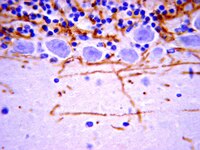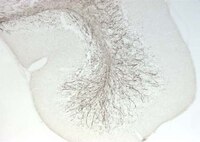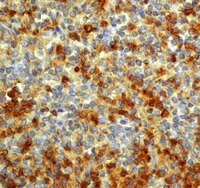Neuroprotective effects of activated protein C on intrauterine inflammation-induced neonatal white matter injury are associated with the downregulation of fibrinogen-like protein 2/fibroleukin prothrombinase and the inhibition of pro-inflammatory cytokine expression.
Jin, SJ; Liu, Y; Deng, SH; Liao, LH; Lin, TL; Ning, Q; Luo, XP
International journal of molecular medicine
35
1199-212
2015
Show Abstract
Maternal intrauterine inflammation or infection is an important risk factor for neonatal cerebral white matter injury (WMI) and future neurological deficits. Activated protein C (APC), a natural anticoagulant, has been shown to exhibit anti-inflammatory, anti-apoptotic, profibrinolytic and cytoprotective activities. Recent studies have demonstrated that the novel prothrombinase, fibrinogen-like protein 2 (fgl2), contributes to the pathogenesis of a number of inflammatory diseases through the generation of fibrin. Thus, we hypothesized that APC may regulate coagulant and inflammatory processes and improve brain injury in an experimental rat model of intrauterine inflammation-induced WMI. The animal model was established by the administration of an intraperitoneal injection of lipopolysaccharide (LPS) to pregnant Sprague-Dawley rats on embryonic day (E)17 and E18. APC was administered intraperitoneally 30 min after the second LPS injection. The expression of fgl2 and the pro-inflammatory cytokines, tumor necrosis factor-α (TNF-α), interleukin (IL)-6 and IL-1β expression in the placentas and fetal brains was determined on E19. Nerve cell death, the brain water content and protease-activated receptor 1 (PAR1) and nuclear factor κB (NF-κB) p65 expression was detected in the fetal brains. WMI in the neonatal rat brains was evaluated by hematoxylin and eosin (H&E) staining and immunohistochemistry for myelin basic protein (MBP). The results revealed that APC markedly reduced the LPS-induced increase in fgl2 expression and fibrin deposition, as well as the production of the pro-inflammatory cytokines, TNF-α, IL-6 and IL-1β, in the placentas and fetal brains. In addition, APC attenuated cerebral apoptosis and brain edema, downregulated PAR1 and NF-κB p65 expression in the fetal brains, and improved hypomyelination and structural disturbances in the periventricular area of the neonatal rat brains. Our observations provide evidence that APC attenuates fetal neuroinflammation and the associated secondary WMI in the developing brain by inhibiting the expression of fgl2 and pro-inflammatory mediators, suggesting that APC may be a potential therapeutic approach for intrauterine inflammation-induced neonatal brain injury. | | | 25777531
 |
Natural and lesion-induced decrease in cell proliferation in the medial nucleus of the trapezoid body during hearing development.
Saliu, A; Adise, S; Xian, S; Kudelska, K; Rodríguez-Contreras, A
The Journal of comparative neurology
522
971-85
2014
Show Abstract
The functional interactions between neurons and glial cells that are important for nervous system function are presumably established during development from the activity of progenitor cells. In this study we examined proliferation of progenitor cells in the medial nucleus of the trapezoid body (MNTB) located in the rat auditory brainstem. We performed DNA synthesis labeling experiments to demonstrate changes in cell proliferation activity during postnatal stages of development. An increase in cell proliferation correlated with MNTB growth and the presence of S100β-positive astrocytes among MNTB neurons. In additional experiments we analyzed the fate of newly born cells. At perinatal ages, newly born cells colabeled with the astrocyte marker S100β in higher numbers than when cells were generated at postnatal day 6. Furthermore, we identified newly born cells that were colabeled with caspase-3 immunohistochemistry and performed comparative experiments to demonstrate that there is a natural decrease in cell proliferation activity during postnatal development in rats, mice, gerbils, and ferrets. Lastly, we found that there is a stronger decrease in MNTB cell proliferation after performing bilateral lesions of the auditory periphery in rats. Altogether, these results identify important stages in the development of astrocytes in the MNTB and provide evidence that the proliferative activity of the progenitor cells is developmentally regulated. We propose that the developmental reduction in cell proliferation may reflect coordinated signaling between the auditory brainstem and the auditory periphery. | | | 24115041
 |
Long-term characterization of axon regeneration and matrix changes using multiple channel bridges for spinal cord regeneration.
Tuinstra, HM; Margul, DJ; Goodman, AG; Boehler, RM; Holland, SJ; Zelivyanskaya, ML; Cummings, BJ; Anderson, AJ; Shea, LD
Tissue engineering. Part A
20
1027-37
2014
Show Abstract
Spinal cord injury (SCI) results in loss of sensory and motor function below the level of injury and has limited available therapies. The host response to SCI is typified by limited endogenous repair, and biomaterial bridges offer the potential to alter the microenvironment to promote regeneration. Porous multiple channel bridges implanted into the injury provide stability to limit secondary damage and support cell infiltration that limits cavity formation. At the same time, the channels provide a path that physically directs axon growth across the injury. Using a rat spinal cord hemisection injury model, we investigated the dynamics of axon growth, myelination, and scar formation within and around the bridge in vivo for 6 months, at which time the bridge has fully degraded. Axons grew into and through the channels, and the density increased overtime, resulting in the greatest axon density at 6 months postimplantation, despite complete degradation of the bridge by that time point. Furthermore, the persistence of these axons contrasts with reports of axonal dieback in other models and is consistent with axon stability resulting from some degree of connectivity. Immunostaining of axons revealed both motor and sensory origins of the axons found in the channels of the bridge. Extensive myelination was observed throughout the bridge at 6 months, with centrally located and peripheral channels seemingly myelinated by oligodendrocytes and Schwann cells, respectively. Chondroitin sulfate proteoglycan deposition was restricted to the edges of the bridge, was greatest at 1 week, and significantly decreased by 6 weeks. The dynamics of collagen I and IV, laminin, and fibronectin deposition varied with time. These studies demonstrate that the bridge structure can support substantial long-term axon growth and myelination with limited scar formation. | Immunofluorescence | | 24168314
 |
Genetic labeling reveals novel cellular targets of schizophrenia susceptibility gene: distribution of GABA and non-GABA ErbB4-positive cells in adult mouse brain.
Bean, JC; Lin, TW; Sathyamurthy, A; Liu, F; Yin, DM; Xiong, WC; Mei, L
The Journal of neuroscience : the official journal of the Society for Neuroscience
34
13549-66
2014
Show Abstract
Neuregulin 1 (NRG1) and its receptor ErbB4 are schizophrenia risk genes. NRG1-ErbB4 signaling plays a critical role in neural development and regulates neurotransmission and synaptic plasticity. Nevertheless, its cellular targets remain controversial. ErbB4 was thought to express in excitatory neurons, although recent studies disputed this view. Using mice that express a fluorescent protein under the promoter of the ErbB4 gene, we determined in what cells ErbB4 is expressed and their identity. ErbB4 was widely expressed in the mouse brain, being highest in amygdala and cortex. Almost all ErbB4-positive cells were GABAergic in cortex, hippocampus, basal ganglia, and most of amygdala in neonatal and adult mice, suggesting GABAergic transmission as a major target of NRG1-ErbB4 signaling in these regions. Non-GABAergic, ErbB4-positive cells were present in thalamus, hypothalamus, midbrain, and hindbrain. In particular, ErbB4 is expressed in serotoninergic neurons of raphe nuclei but not in norepinephrinergic neurons of the locus ceruleus. In hypothalamus, ErbB4 is present in neurons that express oxytocin. Finally, ErbB4 is expressed in a group of cells in the subcortical areas that are positive for S100 calcium binding protein β. These results identify novel cellular targets of NRG1-ErbB4 signaling. | Immunohistochemistry | Mouse | 25274830
 |
Nucleus-localized 21.5-kDa myelin basic protein promotes oligodendrocyte proliferation and enhances neurite outgrowth in coculture, unlike the plasma membrane-associated 18.5-kDa isoform.
Smith, GS; Samborska, B; Hawley, SP; Klaiman, JM; Gillis, TE; Jones, N; Boggs, JM; Harauz, G
Journal of neuroscience research
91
349-62
2013
Show Abstract
The classic myelin basic protein (MBP) family of central nervous system (CNS) myelin arises from transcription start site 3 of the Golli (gene of oligodendrocyte lineage) complex and comprises splice isoforms ranging in nominal molecular mass from 14 kDa to (full-length) 21.5 kDa. We have determined here a number of distinct functional differences between the major 18.5-kDa and minor 21.5-kDa isoforms of classic MBP with respect to oligodendrocyte (OLG) proliferation. We have found that, in contrast to 18.5-kDa MBP, 21.5-kDa MBP increases proliferation of early developmental immortalized N19-OLGs by elevating the levels of phosphorylated ERK1/2 and Akt1 kinases and of ribosomal protein S6. Coculture of N2a neuronal cells with N19-OLGs transfected with the 21.5-kDa isoform (or conditioned medium from), but not the 18.5-kDa isoform, caused the N2a cells to have increased neurite outgrowth and process branching complexity. These roles were dependent on subcellular localization of 21.5-kDa MBP to the nucleus and on the exon II-encoded segment, suggesting that the nuclear localization of early minor isoforms of MBP may play a crucial role in regulating and/or initiating myelin and neuronal development in the mammalian CNS. | | | 23184356
 |
Hyccin, the molecule mutated in the leukodystrophy hypomyelination and congenital cataract (HCC), is a neuronal protein.
Gazzerro, E; Baldassari, S; Giacomini, C; Musante, V; Fruscione, F; La Padula, V; Biancheri, R; Scarfì, S; Prada, V; Sotgia, F; Duncan, ID; Zara, F; Werner, HB; Lisanti, MP; Nobbio, L; Corradi, A; Minetti, C
PloS one
7
e32180
2012
Show Abstract
"Hypomyelination and Congenital Cataract", HCC (MIM #610532), is an autosomal recessive disorder characterized by congenital cataract and diffuse cerebral and peripheral hypomyelination. HCC is caused by deficiency of Hyccin, a protein whose biological role has not been clarified yet. Since the identification of the cell types expressing a protein of unknown function can contribute to define the physiological context in which the molecule is explicating its function, we analyzed the pattern of Hyccin expression in the central and peripheral nervous system (CNS and PNS). Using heterozygous mice expressing the b-galactosidase (LacZ) gene under control of the Hyccin gene regulatory elements, we show that the gene is primarily expressed in neuronal cells. Indeed, Hyccin-LacZ signal was identified in CA1 hippocampal pyramidal neurons, olfactory bulb, and cortical pyramidal neurons, while it did not colocalize with oligodendroglial or astrocytic markers. In the PNS, Hyccin was detectable only in axons isolated from newborn mice. In the brain, Hyccin transcript levels were higher in early postnatal development (postnatal days 2 and 10) and then declined in adult mice. In a model of active myelinogenesis, organotypic cultures of rat Schwann cells (SC)/Dorsal Root Ganglion (DRG) sensory neurons, Hyccin was detected along the neurites, while it was absent from SC. Intriguingly, the abundance of the molecule was upregulated at postnatal days 10 and 15, in the initial steps of myelinogenesis and then declined at 30 days when the process is complete. As Hyccin is primarily expressed in neurons and its mutation leads to hypomyelination in human patients, we suggest that the protein is involved in neuron-to-glia signalling to initiate or maintain myelination. | | | 22461884
 |
Sphingosine kinase 1 and sphingosine 1-phosphate receptor 3 are functionally upregulated on astrocytes under pro-inflammatory conditions.
Fischer, I; Alliod, C; Martinier, N; Newcombe, J; Brana, C; Pouly, S
PloS one
6
e23905
2011
Show Abstract
Reactive astrocytes are implicated in the development and maintenance of neuroinflammation in the demyelinating disease multiple sclerosis (MS). The sphingosine kinase 1 (SphK1)/sphingosine1-phosphate (S1P) receptor signaling pathway is involved in modulation of the inflammatory response in many cell types, but the role of S1P receptor subtype 3 (S1P(3)) signaling and SphK1 in activated rat astrocytes has not been defined.Using immunohistochemistry we observed the upregulation of S1P(3) and SphK1 expression on reactive astrocytes and SphK1 on macrophages in MS lesions. Increased mRNA and protein expression of S1P(3) and SphK1, as measured by qPCR and Western blotting respectively, was observed after treatment of rat primary astrocyte cultures with the pro-inflammatory stimulus lipopolysaccharide (LPS). Activation of SphK by LPS stimulation was confirmed by SphK activity assay and was blocked by the use of the SphK inhibitor SKI (2-(p-hydroxyanilino)-4-(p-chlorphenyl) thiazole. Treatment of astrocytes with a selective S1P(3) agonist led to increased phosphorylation of extracellular signal-regulated kinase (ERK)-1/2), which was further elevated with a LPS pre-challenge, suggesting that S1P(3) upregulation can lead to increased functionality. Moreover, astrocyte migration in a scratch assay was induced by S1P and LPS and this LPS-induced migration was sensitive to inhibition of SphK1, and independent of cell proliferation. In addition, S1P induced secretion of the potentially neuroprotective chemokine CXCL1, which was increased when astrocytes were pre-challenged with LPS. A more prominent role of S1P(3) signaling compared to S1P(1) signaling was demonstrated by the use of selective S1P(3) or S1P(1) agonists.In summary, our data demonstrate that the SphK1/S1P(3) signaling axis is upregulated when astrocytes are activated by LPS. This signaling pathway appears to play a role in the establishment and maintenance of astrocyte activation. Upregulation of the pathway in MS may be detrimental, e.g. through enhancing astrogliosis, or beneficial through increased remyelination via CXCL1. | | | 21887342
 |
Isolation rearing in rats: Effect on expression of synaptic, myelin and GABA-related immunoreactivity and its utility for drug screening via the subchronic parenteral route.
Lim AL, Taylor DA, Malone DT
Brain Res
2011
Show Abstract
Depriving weaned rats of social contact by rearing them in isolation brings about a spectrum of behavioural and neuropathological changes in adulthood which resemble some of the characteristics observed in schizophrenia. Hence, isolation rearing provides a non-pharmacological means to induce in an animal model certain aspects of schizophrenia with a neurodevelopmental origin. We compared the prepulse inhibition and locomotor activity behaviours in group-reared and isolation-reared rats in the context of determining the robustness of any behavioural changes following a subchronic parenteral drug administration protocol. The expression of synaptic, myelin and GABA-related proteins was also assessed in the brains of these rats using semi-quantitative fluorescence immunohistochemistry. Compared to their group-reared counterparts, isolation-reared rats displayed disruption in prepulse inhibition which was lost after repeated testing and subchronic vehicle administration. However, isolation-reared rats showed open-field hyperlocomotion post-subchronic vehicle treatment compared to group-reared rats. Isolation rearing resulted in reduced expression of synaptophysin, synapsin I, myelin basic protein and GABA(B1) receptor proteins, along with an increase in 2\',3\'-cyclic nucleotide 3\'-phosphodiesterase. Of the brain areas examined these observed changes were localised to the hippocampal regions and the substantia nigra. These results suggest an alteration in the synaptic, myelin and GABA-related functions in the brains of isolation-reared rats that displayed behavioural anomalies. Since dysfunction in these systems has also been implicated in schizophrenia, our findings provide additional evidence to support the use of isolation rearing for schizophrenia research; however, its use in the screening of putative antipsychotics following subchronic administration needs to be undertaken warily.Copyright © 2011 Elsevier B.V. All rights reserved. | | | 21241674
 |
Transient degradation of myelin basic protein in the rat hippocampus following acute carbon monoxide poisoning.
Satoru Watanabe,Hirotaka Matsuo,Yasushi Kobayashi,Yasushi Satoh,Masanori Fujita,Akiyoshi Nakayama,Yoshifusa Aizawa,Nariyoshi Shinomiya,Shinya Suzuki
Neuroscience research
68
2010
Show Abstract
The neurotoxicity of carbon monoxide (CO) poisoning is a significant clinical problem, but its mechanisms remain unclear. Previous studies of CO-exposed rats showed spatial memory disturbances and degradation of myelin basic protein (MBP) in the brain; however, regional localization of the degradation was not analyzed. In the present study, we histologically determined the foci of CO effects in the hippocampus. Wistar rats were exposed to CO for 60min (1000ppm for 40min+3000ppm for 20min) and returned into room air. For histological evaluation, the animals were sacrificed 90min, 1, 7 and 14 days after CO exposure and the brain tissue was analyzed with hematoxylin-eosin (HE), Nissl and Gallyas myelin staining as well as immunohistochemistry for MBP and phosphorylated or nonphosphorylated neurofilament. No histological changes were observed on HE, Nissl or Gallyas staining. In contrast, we detected MBP reduction at 90min after CO exposure in the dentate gyrus and CA3, and the recovery of MBP was observed after 14 days. The immunoreactivity of neurofilament also changed after CO exposure. Nevertheless, water maze test showed no significant effects of CO exposure on spatial memory. Our findings demonstrate that CO poisoning causes transient degradation of MBP and axonal injury in the hippocampus even though the animals showed no neurological disturbances. | | | 20633582
 |
Involvement of Notch1 inhibition in serum-stimulated glia and oligodendrocyte differentiation from human mesenchymal stem cells.
Lee, YJ; Hung, SC; Chu, MS
Stem cells and cloning : advances and applications
3
165-73
2010
Show Abstract
The use of in vitro oligodendrocyte differentiation for transplantation of stem cells to treat demyelinating diseases is an important consideration. In this study, we investigated the effects of serum on glia and oligodendrocyte differentiation from human mesenchymal stem cells (KP-hMSCs). We found that serum deprivation resulted in a reversible downregulation of glial- and oligodendrocyte-specific markers. Serum stimulated expression of oligodendrocyte markers, such as galactocerebroside, as well as Notch1 and JAK1 transcripts. Inhibition of Notch1 activation by the Notch inhibitor, MG132, led to enhanced expression of a serum-stimulated oligodendrocyte marker. This marker was undetectable in serum-deprived KP-hMSCs treated with MG132, suggesting that inhibition of Notch1 function is additive to serum-stimulated oligodendrocyte differentiation. Furthermore, a dominant-negative mutant RBP-J protein also inhibited Notch1 function and led to upregulation of oligodendrocyte-specific markers. Our results demonstrate that serum-stimulated oligodendrocyte differentiation is enhanced by the inhibition of Notch1-associated functions. | Western Blotting | | 24198522
 |



















